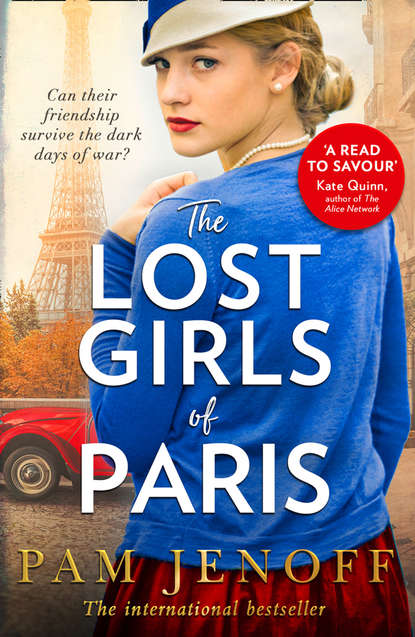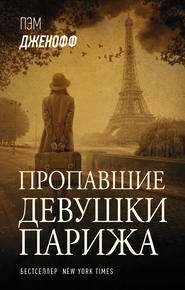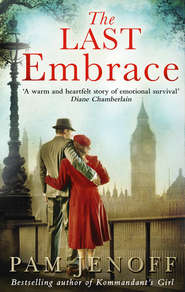По всем вопросам обращайтесь на: info@litportal.ru
(©) 2003-2025.
✖
The Lost Girls Of Paris
Автор
Год написания книги
2019
Настройки чтения
Размер шрифта
Высота строк
Поля
“Really, I don’t think...” she began to demur, surprised by the odd request.
“Please,” he said, cutting her off, his tone almost imploring. “You’d be doing me a kindness.” She wondered why it meant so much to him. Perhaps he had lost someone French or was a veteran who had fought over there.
“All right,” she relented. A few lines couldn’t hurt. She began to read from the poem, “N’importe où hors du monde (Anywhere Out of the World).” Her voice was self-conscious at first, but she felt herself slowly gain confidence.
After a few sentences, Marie stopped. “How was that?” She expected him to ask her to read further.
He did not. “You’ve studied French?”
She shook her head. “No, but I speak it. My mother was French and we spent summers there when I was a child.” In truth, the summers had been an escape from her father, an angry drunk unable to find work or hold down a job, resentful of her mother’s breeding and family money and disappointed that Marie wasn’t a boy. That was the reason Marie and her mother summered far away in France. And it was the reason Marie had run away from the Herefordshire manor where she’d been raised to London when she was eighteen, and then took her mother’s surname. She knew if she stayed in the house she had dreaded all her childhood with her father’s worsening temper, she wouldn’t make it out alive.
“Your accent is extraordinary,” the man said. “Nearly perfect.” How could he know that if he didn’t speak French? she wondered. “Are you working?” he asked.
“Yes,” she blurted. The transition in subject was abrupt, the question too personal. She stood hurriedly, fumbling in her purse for coins. “I’m sorry, but I really must go.”
The man reached up and when she looked back she saw he was holding a business card. “I didn’t mean to be rude. But I was wondering if you would like a job.” She took the card. Number 64 Baker Street, was all it said. No person or office named. “Ask for Eleanor Trigg.”
“Why should I?” she asked, perplexed. “I have a job.”
He shook his head slightly. “This is different. It’s important work and you’d be well suited—and well compensated. I’m afraid I can’t say any more.”
“When should I go there?” she asked, though certain that she never would.
“Now.” She’d expected an appointment. “So you’ll go?”
Marie left a few coins on the table and left the café without answering, eager to be away from the man and his intrusiveness. Outside, she opened her umbrella and adjusted her burgundy print scarf to protect against the chill. She rounded the corner, then stopped, peering over her shoulder to make sure he had not followed her. She looked down at the card, simple black and white. Official.
She could have told the man no, Marie realized. Even now, she could throw out the card and walk away. But she was curious; what kind of work, and for whom? Perhaps it was something more interesting than endless typing. The man had said it paid well, too, something she dearly needed.
Ten minutes later, Marie found herself standing at the end of Baker Street. She paused by a red post box at the corner. The storied home of Sherlock Holmes was meant to be on Baker Street, she recalled. She had always imagined it as mysterious, shrouded in fog. But the block was like any other, drab office buildings with ground floor shops. Farther down the row there were brick town houses that had been converted for business use. She walked to Number 64, then hesitated. Inter-Services Research Bureau, the sign by the door read. What on earth was this all about?
Before she could knock the door flew open and a hand that did not seem attached to anybody pointed left. “Orchard Court, Portman Square. Around the corner and down the street.”
“Excuse me,” Marie said, holding up the card though there seemed to be no one to see it. “My name is Marie Roux. I was told to come here and ask for Eleanor Trigg.” The door closed.
“Curiouser and curiouser,” she muttered, thinking of Tess’s favorite book, the illustrated version of Alice in Wonderland Marie read aloud to her when she visited. Around the corner there were more row houses. She continued down the street to Portman Square and found the building marked “Orchard Court.” Marie knocked. There was no answer. The whole thing was starting to feel like a very odd prank. She turned, ready to go home and forget this folly.
Behind her, the door opened with a creak. She spun back to face a white-haired butler. “Yes?” He stared at her coldly, like she was a door-to-door salesman peddling something unwanted. Too nervous to speak, she held out the card.
He waved her inside. “Come.” His tone was impatient now, as though she was expected and late. He led her through a foyer, its high ceiling and chandelier giving the impression that it had once been the entranceway to a grand home. He opened a door on his right, then closed it again quickly. “Wait here,” he instructed.
Marie stood awkwardly in the foyer, feeling entirely as though she did not belong. She heard footsteps on the floor above and turned to see a handsome young man with a shock of blond hair descending a curved staircase. Noticing her, he stopped. “So, you’re part of the Racket?” he asked.
“I have no idea what you’re talking about.”
He smiled. “Just wandered in then?” He did not wait for an answer. “The Racket—that’s what we call all of this.” He gestured around the foyer.
The butler reappeared, clearing his throat. His stern expression gave Marie the undeniable sense that they were not supposed to be speaking with one another. Without another word, the blond man disappeared around the corner into another of what seemed to be an endless number of doors.
The butler led her down the hallway and opened the door to an onyx-and-white-tiled bathroom. She turned back, puzzled; she hadn’t asked for the loo. “Wait in here.”
Before Marie could protest, the butler closed the door, leaving her alone. She stood awkwardly, inhaling the smell of mildew lingering beneath cleaners. Asked to wait in a toilet! She needed to leave but was not quite sure how to manage it. She perched on the edge of a claw-footed bathtub, ankles neatly crossed. Five minutes passed, then ten.
At last the door opened with a click and a woman walked in. She was older than Marie by at least a decade, maybe two. Her face was grave. At first her dark hair appeared to be short, but closer Marie saw that it was pulled tightly in a bun at the nape of her neck. She wore no makeup or jewelry, and her starched white shirt was perfectly pressed, almost military.
“I’m Eleanor Trigg, Chief Recruitment Officer. I’m sorry for the accommodations,” she said, her voice clipped. “We are short on space.” The explanation seemed odd, given the size of the house, the number of doors Marie had seen. But then she remembered the man whom the butler seemed to chastise for speaking with her. Perhaps the people who came here weren’t meant to see one another at all.
Eleanor appraised Marie as one might a vase or piece of jewelry, her gaze steely and unrelenting. “So you’ve decided then?” she said, making it sound as if they were at the end of a long conversation and had not met thirty seconds earlier.
“Decided?” Marie repeated, puzzled.
“Yes. You have to decide if you want to risk your life, and I have to decide if I can let you.”
Marie’s mind whirled. “I’m sorry... I’m afraid I don’t understand.”
“You don’t know who we are, do you?” Marie shook her head. “Then what are you doing here?”
“A man in a café gave me a card and...” Marie faltered, hearing the ridiculousness of the situation in her own voice. She had not even learned his name. “I should just go.” She stood.
The woman pressed a firm hand on her shoulder. “Not necessarily. Just because you don’t know why you’ve come, doesn’t mean you shouldn’t be here. We often find purpose where we least expect it—or not.” Her style was brusque, unfeminine and unquestionably stern. “Don’t blame the man who sent you. He wasn’t authorized to say more. Our work is highly classified. Many who work at the most senior levels of Whitehall itself have no idea what it is that we do.”
“Which is what, exactly?” Marie ventured to ask.
“We’re a branch of Special Operations Executive.”
“Oh,” Marie said, though the answer really didn’t clarify matters for her.
“Covert operations.”
“Like the codebreakers at Bletchley?” She’d known a girl who had left the typing pool to do that once.
“Something like that. Our work is a bit more physical, though. On the ground.”
“In Europe?” Eleanor nodded. Marie understood then: they meant to send her over, into the war. “You want me to be a spy?”
“We don’t ask questions here,” Eleanor snapped. Then it was not, Marie reflected, the place for her. She had always been curious, too curious, her mother would say, with never-ending questions that only made her father’s temper worsen as Marie progressed through her teen years. “We aren’t spies,” Eleanor added, as though the suggestion was offensive. “Espionage is the business of MI6. Rather, here at SOE, our mission is sabotage, or destroying things like railroad tracks, telegraph lines, factory equipment and such, in order to hinder the Germans. We also help the local partisans arm and resist.”
“I’ve never heard of such things.”
“Exactly.” Eleanor sounded almost pleased.
“But what makes you think I could have any part in something like this? I’m hardly qualified.”
“Nonsense. You’re smart, capable.” How could this woman, who had only just met her, possibly know that? It was perhaps the first time in her life that anyone had described her that way. Her father made sure she felt the very opposite. And Richard, her now-gone husband, had treated her as if she was special for a fleeting moment, and look where all that had led. Marie had never thought of herself as any of those things, but now she found herself sitting a bit taller. “You speak the language. You’re exactly who we’re looking for. Have you ever played a musical instrument?” Eleanor asked.
Though it seemed nothing should surprise her anymore, Marie found the question strange. “Piano when I was very young. Harp in school.”
“That could be useful. Open your mouth,” Eleanor ordered, her voice suddenly terse. Marie was certain that she had misheard. But Eleanor’s face was serious. “Your mouth” came the command again, insistent and impatient. Reluctantly, Marie complied. Eleanor stared into her mouth like a dentist. Marie bristled, resenting the intrusion by a woman she had only just met. “That back filling will have to go,” Eleanor said decisively, stepping back.














